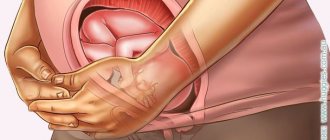Features of emptying infants
Each child has his own norm.
If the baby does not poop after each feeding, or his stool does not have a yellowish tint, this does not mean that there are any problems with the baby. The conditions and type of defecation depend on various components:
- maturity of the digestive system;
- type of feeding;
- what kind of birth was it?
- are there pathologies in development and health;
- how does mom eat?
- what formula the baby is fed, or what composition of breast milk.
Important! If your baby’s stools have become rare, but the baby continues to pee at least 10 times, is active, cheerful, and is gaining weight well, then you shouldn’t panic right away. It is likely that the situation will improve soon.
You can determine the norm of bowel movements not only by the amount and type of feces, but also by the following indicators:
- the child's well-being;
- painless bowel movements;
- absence of impurities and mucus in excrement.
The emptying mode depends on:
- Frequency of defecation.
- Amount of feces. In the first month of life it is only 5 grams. (15-20 per day). In a year, in one sitting, the amount reaches 100-200 grams.
- Consistency of excrement. In infants it is a mushy substance, but it can also be thicker or thinner. Ideally, the stool is homogeneous, evenly spread, sometimes with lumps. It becomes harder with age.
- Colors. May be golden yellow, greenish yellow, with white lumps. After completion, the gw turns brown.
Stool color and reasons
- Smell. In breastfed infants, feces have a sour aroma; in formula-fed infants, it has an unpleasant, putrid-rotten odor.
- Impurities. Lumps of undigested mixture are acceptable. There should be no pus or blood.
Why doesn't my baby poop during guarding? The most important reason for this is the complete absorption of milk. Breastfed babies can defecate up to 7-10 times a day (the same as the frequency of feedings). But there is a delay in stool for up to a week.
Note! Evgeny Komarovsky, a Russian pediatrician, urges parents not to worry if the baby has not had a bowel movement for several days. Abroad, they sound the alarm only when there has been no bowel movement for more than a week.
The baby's nutrition during breastfeeding directly depends on the mother's diet. She needs to think carefully about her diet, exclude fatty foods and sweets so that there are no lumps or impurities in the newborn’s stool, and he is not bothered by constipation and gas.
Additional Information. An excess of carbohydrates in the mother’s menu will increase fermentation in the baby’s intestines, he may experience colic, flatulence, bowel movements will increase and will have a foamy appearance.
Some foods in a nursing mother's diet cause allergies in the baby, skin rashes, and stools become liquid and contain mucus. If there is not enough milk, the baby may become constipated.
If a bottle-fed newborn poops poorly, the main reason for this may be an incorrectly selected formula. Children begin to become constipated, it becomes difficult to defecate on their own, the baby constantly screams, and the tummy gets tense.
Bristol Stool Shape Scale
Artificial babies defecate 3-5 times a day in the first months. Their stool is more viscous, dense, dark yellow in color, smears heavily, and has an unpleasant aroma. If the parents suddenly switched the baby to the formula, stool retention is likely, or, conversely, diarrhea will appear.
Under no circumstances should newborns be fed cow's milk. In such cases, the stool becomes liquid, digestion worsens, and the smell vaguely resembles the aroma of moldy cheese.
Why doesn't a newborn poop if his diet hasn't changed in any way, and should I be concerned? In this case, it is recommended to monitor the baby abroad. If he gains weight well and urinates regularly, then the delay in defecation can reach 10 days.
During breastfeeding, stool may linger for a week due to complete absorption of milk.
The direct reason for the lack of regular bowel movements lies in the fact that the mother has good breast milk, so it is completely absorbed. The baby simply has nothing to defecate with. If your artificial baby suddenly begins to poop irregularly, you should try replacing the formula.
Additional Information. In the first months, the baby’s gastrointestinal tract is adjusted; it adapts to different types of milk (“hind” and “front”). Often, mothers are advised to go on a strict diet (since their milk is too fatty to digest) if the baby’s bowel movements have not stabilized by three months.
During teething, bowel movements may be absent for 2-3 days.
How many times should a newborn walk while breastfeeding?
In principle, there are no standards for infants. When a baby feeds on mother's milk, he can walk from one to several times a day. Sometimes he may not poop once for a whole day. Therefore, if the baby has not pooped, but feels great, does not cry, and does not have a tummy ache, then there is no need to worry.
In the first month of their life, babies poop quite often. Basically, this process occurs after feeding, and since babies often latch on to the breast, their bowel movements are repeated in accordance with the frequency of feeding. This happens approximately 7-8 times a day.
The older the child gets, the less often he eats and the less often he goes to the toilet. So, a two-month-old baby defecates about 3-6 times. Upon reaching three months, the functioning of the digestive system and intestines is already fully improved. Parents notice that the baby is hardly bothered by colic and poops much less often, up to 2 times a day.
Important! If you notice that your baby's stool is green and foamy, this means that your baby is not getting enough calories from hindmilk. Solution - try not to quickly change breasts when feeding.
All children are completely different, they have different organisms, and, accordingly, different needs. Sometimes babies, even 3-4 months old, poop about 10 times a day. Of course, if the parents are worried, you can show the baby to the doctor.
You can find out which fermented milk formulas are best for newborns in our article. We read about leukocytes in the stool of infants here.
What to do if a newborn’s tummy hurts, read the link
But if he feels well and is gaining weight, then there is no need to worry, this is just a feature of your baby. For example, some children generally poop once every two days, or even less often, but at the same time they feel good and gain weight. So you don’t need to do anything, and don’t torture your child with suppositories and enemas.
Newborn doesn't poop - 6 reasons
There is no need to sound the alarm if your baby poops every other day or, conversely, several times in one day. Each organism is purely individual, and accordingly, the rhythm of bowel movements is also different for all babies. However, if the child has not pooped for more than a week, then you should be wary. Lack of stool can occur for the following 6 reasons:
- The abdominal anterior wall is not fully developed;
- Weak intestinal peristalsis;
- Stress in a baby;
- Introduction of a new food product;
- A sharp transition from mother's breast milk to artificial nutrition;
- Incorrect formula or nutrition for a nursing mother.
Constipation is very difficult for a small baby to bear. For this reason, he may lose sleep and appetite. To alleviate the baby’s condition, appropriate procedures are required.
- In order to soften the abdominal wall, you need to massage the baby's tummy. This must be done clockwise;
- It is necessary to provide the child with a calm environment;
- If the baby is fed on breast milk, then the mother should change her diet. Also, a small amount of prunes eaten by a woman will help the baby poop. But, you should not neglect it, as this can cause bloating or diarrhea;
- If the intestines stop emptying after changing the diet, then you should try to feed the child one formula for a certain period;
- You need to see a doctor. Typically, your pediatrician will prescribe enemas for bowel movements.
Don't panic if your newborn doesn't poop for less than a day or several days. There are certain norms for bowel movements of a child who has only recently been born.
Deviations from the norm. What should you be wary of?
Each baby is individual, and any deviation from the normal values should not be too alarming. But there are conditions that should force parents to pay closer attention to the baby’s well-being, and sometimes even consult a doctor.
- Watery, very frequent stools in babies aged 0-3 months. If the baby poops almost “water”, this may be a sign of lactase deficiency , as well as various infections and dysbacteriosis .
- Frequent loose stools in children over 6 months of age may be diarrhea . This symptom, combined with vomiting and fever, indicates the presence of an acute intestinal infection. It is necessary to call a doctor, or in severe cases, an ambulance. Before their arrival, give the child plenty of water (preferably salted, you can buy the ready-made drug “Regidron”). During diarrhea, it is very important to prevent dehydration of the small body.
- Lack of stool for several days, in other words, constipation . This is a very unpleasant and painful condition for children .
The inability to empty the intestines provokes bloating, gas retention, and colic. To prevent constipation, you need to give the baby enough fluid (especially children in the first half of life who are bottle-fed).
- If the child is already eating complementary foods, you can add more fruits (prunes, apples), cereals and fermented milk products (baby yogurt, kefir) to his diet. If your baby is prone to constipation, you should limit the menu to rice, pears, and cottage cheese , as they have a strengthening effect.
- The appearance of mucus, streaks of blood, undigested food particles, foam in the baby's stool, as well as the appearance of a sharp putrid odor - all this is a reason to consult a doctor! You should not delay going to the hospital, as this may worsen the baby’s condition. There are a huge number of reasons for such changes in stool, and only an experienced pediatrician can determine them after prescribing the appropriate tests and examination.
Let's find out when newborns begin to see. Norms of physiological development. How many times a day should a newborn eat https://mamavika.com/detsk-zdorov/uhod-za-malyishom/skolko-raz-dolzhen-kakat-novorozhdennyiy.html? Feeding rules.
In general, all the numbers that are given in modern medicine as normal values are approximate. You should not strictly count the number of bowel movements of your child in order to calculate whether the baby poops “normally” or not. It is much more important to monitor the general well-being of the baby.
If a child eats well, gains weight, and does not suffer from abdominal pain, then there is no reason for parents to panic or worry .
But if you notice the appearance of alarming symptoms, or the baby behaves restlessly, often cries, or twists its legs, then it is best not to delay and consult a doctor. Only a competent specialist will help you find the cause and prescribe appropriate treatment.
How many times a day should a newborn poop?
The frequency of bowel movements directly depends on the type of food the baby eats. It is extremely rare that problems with stool appear in those children who are breastfed; they can poop up to seven times in 24 hours, and this is the absolute norm. While babies who are fed breast milk can go to the toilet up to four times in one day.
- Rare bowel movements are when a baby does not poop for a long time. For a breastfed baby, the norm is once a day, and for bottle-fed babies - once every two or three days. If the baby’s intestines do not empty for longer than this time, then stool is rare. An enema should be given only in a situation where the child is crying and straining;
- Frequent bowel movements are when a baby poops at a minimum interval of more than seven times a day, whether breastfed or bottle-fed. The very fact that the baby poops often should not be alarming. Perhaps he has a fast metabolism or a good appetite. However, it is not normal if the consistency foams, has a pungent odor and a greenish tint. In this case, you need to make an appointment with a doctor and reconsider your diet. Sometimes constipation is accompanied by fever.
As already mentioned, each baby’s intestines work differently. In itself, rare and frequent bowel movements should not be alarming. First of all, you need to monitor the baby’s condition.
Normal stool frequency
Parents often wonder how many times a day a child can poop. The frequency of bowel movements in an infant depends on the way he is fed.
If breastfeeding is natural, the baby will defecate frequently, about 8 times a day.
. In the early stages of life, a newborn may defecate after each feeding; with age, the frequency of stools becomes less frequent. Usually reduced to once a day. A breastfeeding baby may not poop every day, but in this case, pay attention to his well-being. If the child is cheerful and cheerful, then this frequency of stool is normal for him.
With artificial feeding (IV), stool depends on the correct selection of the mixture
. Usually in the first days the frequency of artificial stools is up to 4 times a day. With age, it changes towards a decrease and can decrease to 1 time in 2 days. Artificial feeding increases the risk of constipation.
In any case, it is important to look at the condition of the baby. If nothing bothers the child and he is gaining weight well, then the frequency of bowel movements is not so important.
Even if the baby doesn't poop every day.
What not to do
How many days can a baby go without pooping? While breastfeeding, such situations are very rare, but the delay can be within 7-10 days. Artificial children, if the formula is correctly selected, should not have constipation and related problems.
We invite you to familiarize yourself with Botox on the forehead and between the eyebrows: description of the procedure, contraindications, how long it lasts
If the baby himself does not poop, then you should not immediately reach for medicine. You should also avoid enemas. As practice shows, children and even adults who suffer from constipation are those who were often given enemas in infancy.
7-10 days without bowel movement is normal, but you shouldn’t let these days go to chance. You can and should help the baby poop.
Massage
If a newborn baby does not poop for a day and does not pass gas, it is worth giving him a gentle massage. Use a full palm to rub it over your tummy in a clockwise circular motion. This will improve gastrointestinal peristalsis, increase blood circulation, and relax the muscles.
Tummy massage
Exercises
If the baby poops poorly and rarely, then as a preventive measure you should constantly perform light exercises:
- "Bicycle" Perfectly complements massage. The legs are bent at the knees one by one, imitating riding a bicycle.
Exercise "Bicycle"
- Hold the baby in the “dropping” position. The baby is held under the knees, the butt sags. The body is held strictly in an upright position - this is how the process of bowel movement is stimulated. To prevent your newborn from crying, you can lubricate the anus with baby cream. This will help avoid irritation of the skin and mucous membranes.
Warm baths
If the baby does not poop for more than a day, then a warm bath comes to the rescue. If you also feed the baby in the bathroom, the process will speed up. Warm water (up to 37 degrees) will relax the baby, calm him down, and feeding will start the process of defecation.
Other methods
If a child does not poop at 1 month, and all methods have already been tried, you can proceed to mechanical stimulation options:
- Insert the gas outlet tube. Helps if the gas doesn't come out;
- Glycerin suppository;
- A sanitary stick lubricated with baby oil. Before insertion, you should prepare: wash your hands, lubricate the baby’s anus with oil, the devices should also be clean.
- Medications in consultation with the pediatrician.
Note! When a month-old baby does not poop for a day or more, mothers are very worried and immediately try to resort to dangerous methods of influence. Some of them make the biggest mistake: giving a few drops of fruit juice, because this will start digestion. However, this can irritate the intestinal lining and lead to severe dehydration.
What not to do:
- Give enemas. The microflora that has just established itself is disrupted. This may have consequences in the future.
Microlax for children
- Sticking pieces of soap into the anus can burn both the passage and part of the mucous membrane.
- Giving fresh juices from berries or fruits will not only cause intestinal irritation, but also the proliferation of staphylococci and candida fungi in the child’s body.
- Give adult medications in microdoses. The older generation advises “mixing” laxatives into mother’s milk; this should never be done.
Delayed bowel movements in infants can occur for various reasons. Initially, you should consult your pediatrician on this issue. The doctor will analyze all the data and suggest massage, exercises or other treatment methods. If dysbiosis is detected in the baby, he will be prescribed medications to restore the flora.
What to do if the baby has very rare stools?
Rare stools can be both normal and abnormal. Children, when they feel unwell, show it through their behavior, so it is important to listen to warning signs.
How can you tell if your baby is constipated?
With constipation, the child loses his appetite, becomes restless, cannot poop normally, the stool is hard, and comes out rarely and with great effort.
Help with constipation in a newborn
There are several ways to cope with constipation in a newborn:
- give him a massage (soft circular movements on the tummy, straightening the legs and pulling them into the tummy);
- monitor the quality of breast milk or formula;
- take medications (espumisan, duphalac, etc.);
- candles;
- gas outlet pipe;
- irritation of the anal passage.
Suspicion of Hirschsprung's disease
If a newborn has not pooped for more than 48 hours, this may be an alarming sign of Hirschsprung's disease, when the muscles in some parts of the intestines do not contract and do not remove feces from the body (the child simply cannot poop on his own).
The disease can be identified by a wide, frog-like abdomen. However, only a doctor can make this diagnosis or, conversely, refute it.
Let us only note that this pathology is congenital and can be treated with an enema (for mild cases) and surgery (one case in 5000, occurs mainly in boys).
How many times a day should a month old baby poop?
There are times when a baby does not poop, but still farts. Don't rush to see a doctor. Since gases pass away in this condition, the child should not experience bloating or pain. Just wait until your baby poops. You can give the baby boiled water to drink and do a stroking massage on the tummy to help move intestinal masses.
It happens that the baby does not poop for several days. In such cases, parents worry, because, in their opinion, the baby should defecate at least once every day. But this is not entirely true. A breastfed baby may not poop for several days, and this is considered normal.
After all, almost all of mother's milk is absorbed by the baby's body. Artificial babies must poop more often. In this case, you need to more carefully monitor the child’s regular bowel movements. The reasons why your baby does not poop may be:
- Insufficient intestinal motility;
- The anterior abdominal wall is underdeveloped;
- Formula is not suitable for feeding;
- Reaction to the introduction of a new product;
- Errors in the nutrition of a nursing mother;
- Replacing breast milk with another food.
If the baby does not poop for more than 5-7 days, be sure to consult a doctor to rule out pathologies. If there are no pathologies, then most likely the child is constipated.
At this age, a breastfed baby is able to poop up to 8-9 times a day, after almost every feeding process.
There are times when a baby poops 1-2 times a week, but in large quantities. If the baby is in good health and has no colic, we can talk about normal indicators of this process.
Children who are bottle-fed poop much less often - up to 4 times a day. If the readings are less than normal, then we can talk about constipation in the baby.
- If a child who is one month old poops more than 10-12 times a day, and the stool has a specific smell, foam appears or the color has changed to green, then an urgent consultation with a pediatrician is necessary. This could be either a mistake in the mother’s daily diet or a more serious illness that will require a thorough examination.
- If your baby is unable to poop for a long time and starts crying when he tries to push, the baby is most likely constipated. The best option to solve the problem is to use products with a laxative effect and drink plenty of water. In extreme cases, you can use an enema, while taking medications is possible only after consulting a doctor.
- Colic, as well as increased formation of gases, cause a lot of trouble for the baby. These problems can be corrected with changes in diet, as well as abdominal massage.
Diarrhea in infants
If the baby is still confirmed to have an infection or disease, then you cannot:
- Stop breastfeeding completely and introduce your child to artificial formula;
- Introduce a “clockwise” feeding system;
- Give the baby water after feeding;
- Resort to self-medication.
We invite you to familiarize yourself with Seven ways to overcome evil colic in a breastfeeding baby
The main thing a woman who has a small child should remember is to monitor her diet if the baby is breastfed, and also monitor the amount of formula when bottle-fed. If the consistency of stool has changed and changes occur in the child’s general condition and behavior, it is worth making an appointment with a pediatrician.
The absolute exception to all situations is if the child does not poop, but farts. In this case, you can immediately exclude all diseases associated with the functioning of the stomach and intestines. You just need to wait until the baby poops. As a rule, the baby’s tummy will not hurt and there will be no bloating, as gases leave the body. In order to speed up the process of bowel movements, you should stroke your baby’s belly and give him boiled water to drink.
Signs of constipation
Due to changes in bowel function, many one-month-old children experience delayed bowel movements.
Most likely, after a while the baby’s stool will be restored and he will start pooping again. In this case, you should pay attention to the fact that after a break in bowel movements the baby’s feces remain soft. This will confirm that the baby does not have digestive problems, but only a physiological break in bowel movements. If the baby has hard stool or the child tenses during bowel movements, defecation occurs with difficulty, which means the baby is suffering from constipation.
In this case, doctors recommend:
- Review the mother's diet if the child is breastfed. She should exclude foods that increase gas formation, and also check whether the medications she uses have a binding effect.
- Formula-fed babies should replace formula milk. Most formulas contain palm oil, which can cause constipation in babies.
- Consult with a pediatrician and develop a set of measures that will help eliminate the problem of constipation in your baby. You may be able to cope with constipation with abdominal massage and a warm heating pad, or you may need to select bifidum medications and prescribe glycerin suppositories or an enema. It should be remembered that an enema negatively affects the intestinal microflora, which can subsequently aggravate the problem of constipation.
- In this case, the use of laxative products such as beet juice, vegetable oil, and flax seed decoction will be effective. The dosage should definitely be discussed with your doctor; usually it is enough to give a few drops of the decoction two to four times a day.
Read also:
Jaundice in newborns, and everything connected with it
Should I worry?
Doctors all over the world agree: if the baby is cheerful, active and gaining weight well, then everything is fine with his health.
What to do if the baby does not defecate:
- Day. When a newborn baby doesn't poop for 24 hours, there's no need to worry at all. This may be due to a variety of reasons, ranging from lack of sleep, anxiety, to deterioration in well-being. Maybe it’s just that everything he sucked from his mother’s breast was absorbed.
- Two days. When a newborn does not poop for the second day, but does not show any anxiety, then there is no need to panic either. You can feel the tummy, track how the gas comes out.
- Three days. You can stimulate the intestines with a massage, exercise “bicycle” and raising your legs, lay it on your tummy.
Important! When a newborn does not poop all day, but still passes gas, it means that everything is fine with intestinal patency.
What symptoms should you be wary of:
- The child strains, cannot fart, cries and worries;
- The tummy has become “stone-like”; when pressure is applied to it, the baby begins to cry and feel pain.
- The cry is sharp, caused by pain, and not by fatigue and hunger.
- The baby does not want to eat and refuses.
It is also important to understand that with constipation, stool becomes hard and difficult to pass out of the intestines. If a child defecates a mushy substance once every 4-5 days, then everything is fine. You should wait until 7-10 days to have a bowel movement, and then consult a doctor.
Why does a newborn baby not poop for a day or more? This may signal the onset of the disease. Since the incubation period of some diseases lasts several days, they may manifest themselves a little later. You should wait up to 7-10 days, then consult a doctor if necessary.
Stool of a newborn with artificial feeding
When should you help your child? Typically, a baby can go without pooping for up to 2-3 days without any risk to health. But if the mother notices that the child’s tummy is seething, he is straining, crying, he needs help. The easiest way to do this is with a glycerin suppository - for children (Glycelax) or half of an adult one. Another good option is Microlax microenemas. They are also partially composed of glycerin. Some mothers insert a cotton swab into the baby's anus and lightly press on the wall of the rectum, thereby causing the baby to push. But it’s better not to do this to avoid injury.
Interesting: How long does it take for newborns to pass meconium?
When should you visit a doctor?
If you have any problems or questions about your newborn's stool, you can consult your pediatrician. In what cases is it necessary to consult a doctor:
- Frequent, recurring constipation;
- Signs of diarrhea;
- Vomiting in an infant;
- Unreasonable change in the color and smell of stool, the presence of mucus or blood in it:
- A sharp change in the consistency of stool (became hard instead of mushy).
These signs may be symptoms of a serious medical condition, so report them to your doctor as soon as possible.
The pediatrician deals with problems with the baby's stool. You need to visit him urgently if:
- The child's stomach hurts from constipation, he cries constantly, he has completely lost sleep and appetite;
- The baby's tummy is swollen and rumbling sounds are heard from it;
- The baby started vomiting;
- Increased body temperature;
You should consult a doctor not only if you have constipation, but also if you have a strange consistency after bowel movements. For example, a newborn baby's stool should be in the form of mush. It is absolutely not normal if there are any seals in it. You should also be wary if the impurity has a green tint or bloody appearance.
The most difficult situation is if the child has no stool and no gas at the same time. Thus, he develops bloating, which is accompanied by unpleasant painful sensations.
As a rule, how much a newborn should poop depends on many factors. First of all, it is necessary to maintain proper nutrition and select a high-quality mixture. You need to be patient and help your baby overcome this small illness.
The importance of normal bowel movements for infants on IV
In the first days after birth, doctors especially carefully question young parents about the characteristics of the baby's stool. This is easy to explain, because any change in the consistency, smell, or color of feces can signal the presence of some pathology in the baby’s body or a lack of nutrition he receives.
- Bright yellow or unnatural orange stool may indicate liver problems.
- Green stool can be caused by many reasons: dysbacteriosis, jaundice, staphylococcus, infection or even lactose intolerance.
In the first week of life, green stool (meconium) is normal. - The dark color of stool or the presence of streaks of blood in it can be explained by the presence of microcracks in the baby's anus or bleeding in the upper gastrointestinal tract.
- Colorless feces appear with jaundice or with abnormalities in the structure of the gallbladder.
- Liquid stool with a lot of cheesy inclusions means that the baby is overeating and his digestive system does not have time to digest food.
What kind of stool (poop) should a child have (video)
Parents often wonder how many times a day a child can poop. The frequency of bowel movements in an infant depends on the way he is fed.
If breastfeeding is natural, the baby will defecate frequently, about 8 times a day. In the early stages of life, a newborn may defecate after each feeding; with age, the frequency of stools becomes less frequent. Usually reduced to once a day. A breastfeeding baby may not poop every day, but in this case, pay attention to his well-being. If the child is cheerful and cheerful, then this frequency of stool is normal for him.
With artificial feeding (IV), stool depends on the correct selection of the mixture. Usually in the first days the frequency of artificial stools is up to 4 times a day. With age, it changes towards a decrease and can decrease to 1 time in 2 days. Artificial feeding increases the risk of constipation.
Even if the baby doesn't poop every day.
The mother should be wary of the sudden changes that occur with a child of any age. For example, if a baby always pooped once a day and suddenly began to poop 4 times a day more liquidly, you cannot ignore this and determine the cause.
The reason may be
- Changes in diet, introduction of new foods into the diet, overeating. For children who are fed breast milk - changes in mother's diet. For artificial drinkers - a sudden change in the mixture.
- Disruption of the diet - erratic frequent feeding.
- Change of drinking water.
- Prescribing any medications to the child.
- Teething.
- Infection.
You can try to eliminate the first four factors yourself. You just need to wait it out for loose stools caused by teething, but if you are not completely sure that the cause is teething, it is better to consult a doctor. If the reason is not clear, it is better to show the child to a doctor. If an infection is suspected, you must consult a doctor.
Greetings, dear readers! New parents “under a magnifying glass” examine everything related to the baby: from a spot on the body to the contents of a diaper. After all, a baby’s stool can say a lot about their state of health. Here it begins: how often does a newborn go to the toilet? Why hasn't he pooped for two days now?
Don't panic, let's look at how the bowel movements of a little person who has just been born change.
At first it is black or dark green in color - this is the original meconium, which accumulated in the intestines in the womb. It consists of digested organic particles, amniotic fluid, bile and mucus.
The tarry meconium is odorless and does not wash off from diapers. Its release lasts 3 days and is a good sign that everything is fine with the baby’s digestion. If meconium is defecated on days 4 and 5, the baby does not receive enough breast milk and may not be able to suck it out. Consult a lactation specialist about this issue.
Gradually, the stool becomes mushy and light yellow in color, it increases in volume, and has a milky-sour smell. May contain white lumps and mucus. It is during this transitional stage that colostrum is replaced by transitional milk. Changes occur in the intestines, which will then affect its health.
We suggest you read: How long should discharge last after childbirth?
By 10-14 days, the stool becomes mature - mushy, dark yellow in color. Its shade depends on the mother's diet.
Why does my stool turn green? There may be several reasons for this:
- when exposed to oxygen, it oxidizes and changes color from yellow to green;
- mother’s consumption of green foods (cucumbers) or exotic fruits;
- if you switched your baby from breastfeeding to formula.
Monitoring the number of bowel movements can indicate whether the baby has enough milk. How many times a day does a baby normally poop? When breastfeeding 6-8 times, in fact after each feeding. And with artificial - 3-4 times, the feces may be brownish in color and have an unpleasant odor.
After the first month and until complementary feeding is introduced, the baby may poop once every few days. There is no need to worry here. How long can a newborn go without going to the toilet? Some babies manage to go without a bowel movement for up to 15 days. If the child feels great and gains weight well, then this is considered normal.
Pathological changes in stool and methods of treatment
How and how many times a day a baby should poop is a question that concerns most new parents. Therefore, it is important to understand what constitutes a pathology and when it is necessary to take immediate action.
Abnormal bowel movements
The rate of bowel movement in a newborn is a relative concept. This is due to many factors. Changes in the frequency of bowel movements are the most common disorder.
What indicators should alert parents:
Constipation
How to determine if your baby is constipated:
Help with constipation
First of all, it is necessary to establish for sure that the baby is constipated. Judging only by the frequency of bowel movements is ineffective; the baby should experience discomfort from the inability to empty the intestines.
If, however, discomfort occurs suddenly in the baby and occurs in an acute form, then it is necessary to start with easy methods. You can bend your baby’s legs at the knees and lightly press them to your chest, just for about ten seconds. Then massage your tummy clockwise and repeat the manipulations with your legs.
Provided that the child still does not poop, you can put a glycerin suppository or make a microenema. If such means are not available, then you can try using a gas outlet tube. It must be lubricated with Vaseline and inserted to a minimum depth. This will relax the sphincter and the baby will be able to poop.
Important! You should not abuse enemas if constipation constantly plagues your baby. It is necessary to improve the digestion process and remove the very cause of discomfort.
Diarrhea
The presence of diarrhea in an infant can be judged by an increase in the number of bowel movements twice as compared to the usual state. The stool will be liquid and may contain mucus. Depending on the cause, treatment will vary.
What can cause diarrhea:
Irregular bowel movements in infants
Irregularity means alternating episodes of constipation and diarrhea, or periodic bowel disorders. The reason for this condition is an irrationally structured diet or untimely introduction of complementary foods.
To correct this pathology, you can adjust the mother’s diet, eliminating all harmful foods, and also feed the baby by the hour.
Change in stool quantity
There are two main disorders associated with the amount of stool:
The disorder is most often caused by a violation of the diet or diet.
Change in consistency
Any changes in the consistency of stool should alert parents. If this is a one-time event, then there is no need to panic. You just need to remember what was different that day and find a possible reason. For prolonged periods of constipation or diarrhea, you should consult a pediatrician for advice.
Color change
The color of stool can say a lot about the health of the baby. And if your baby poops yellow or yellow-green, then there is nothing to worry about. But there are times when the color of the intestinal contents changes dramatically and you need to urgently consult a doctor.
If the stool turns black, this may indicate bleeding in the upper digestive tract. You must call a doctor immediately.
The appearance of colorless feces also indicates pathology. The baby may poop this way if he develops obstructive jaundice or problems with the bile ducts.
Pathological impurities
Pathological impurities include:
Constipation in newborns. How to help?
With constipation, the baby cannot poop; he experiences discomfort, often bloating, and pain.
The child is capricious a lot, sleeps poorly, and becomes lethargic. How to help your baby in this case:
- Try to determine the cause of constipation and eliminate it. Change the formula, cancel the new complementary foods, watch your diet.
- Give your baby a tummy massage. Stroke your tummy clockwise in a circular motion, gradually widening and narrowing the circle. This helps enhance intestinal motility.
- Provide your baby with peace and care.
- Contact your pediatrician. He will prescribe laxative enemas or suppositories according to the child’s age.
If a newborn does not have a bowel movement for more than two days, this may be a sign of Hirschsprung's disease. This is a congenital abnormal development of the large intestine expressed by chronic constipation. Detection of this disease depends on its degree.
In the first degree, the baby from birth has signs of intestinal obstruction (meconium and gases do not pass out), vomiting, and flatulence. With other degrees of the disease, frequent constipation requiring an enema, relapses are especially common when switching to artificial feeding. Frequent constipation leads to intoxication of the body. The treatment for this disease is surgery.
Therefore, if you experience frequent recurring constipation, be sure to consult your doctor.
What if the baby can’t go to the toilet? He cries a lot, grunts and strains, but he can’t squeeze the poop out of himself? This happens more often with artificial babies, the composition of their feces is close to that of an adult, and the intestines have not yet learned to cope with large volumes.
Infants' food has a unique composition and is absorbed as completely as possible. And you can talk about constipation only if the feces are hard and dry.
The newborn does not go to the toilet, what should I do? Over time, everything will get better, but in the meantime, do more often to prevent such phenomena. Gives a good effect:
- Tummy massage - stroke your tummy clockwise. Movement of the hands in this direction helps to expel gases, which are the main cause of discomfort. Start with light touches and gradually intensify. Pay special attention to the area on the left side of the lower abdomen - this is where the large intestine is located. In the area of the right hypochondrium, where the liver is located, on the contrary, be very delicate.
- Then press the baby's legs to the tummy and hold them in this position for 20-40 seconds, then return them back. Repeat 10 times.
- Perform the “bicycle” exercise - alternately bend and unbend your baby’s legs. At the same time, you can hum to him a cheerful song “We are going, going, going...”.
- Complete the gymnastics with stroking movements of the tummy.
As a result of this complex, intestinal motility increases, gases are released, and constipation disappears. To perform a massage, no special skills are required, and the best therapeutic effect will be provided by mother’s warm hands.
Diarrhea in a newborn
Another disorder of the digestive system is diarrhea - frequent loose stools. As noted earlier, the baby poops quite often in the first weeks of life and his stool is quite liquid. This is fine.
But, if suddenly the child’s stool becomes more frequent and becomes watery, foamy, and the smell changes, then this is definitely diarrhea, in other words, diarrhea. Diarrhea is a sign of intestinal disease. Requires urgent medical attention, because Dehydration can quickly set in, leading to an increase in temperature.
The first days after the maternity hospital are the most exciting for young parents, so we decided to write material that will dot all the points in the most important process - feeding newborns in the first days.
Dangerous stool of an artificial newborn
If blood, mucus, foam appears in the baby's stool, or it is colored green, this indicates the presence of an intestinal infection in the body. You need to see a doctor urgently! The reason may lie in external factors, or it may lie within. Only a doctor can correctly assess the child’s condition and prescribe treatment. Your child may need to be on a lactose-free diet for some time. But these are temporary difficulties - as soon as the infection goes away, you can return to normal nutrition.
How many times should a baby poop in 1 month 2 months 3 months 4 months
By the beginning of the 2nd month of life, the baby’s feeding schedule is being established. As a rule, a baby aged from one to 4 months is fed 6-7 times a day, according to this, he should have stool from 1 to 7 times a day.
A one-month-old baby's bowel movements eight to ten times a day should alert the mother and prompt her to contact a pediatrician.
But if the baby’s stool is yellow, mushy, and smells like sour milk, the cause of frequent stool may be an improperly organized feeding regimen or a violation of the mother’s diet.
Having 1 bowel movement every 2 days is normal for a 1-4 month old baby.
The stool of a 1-4 month old baby is yellow, of uniform consistency, liquid or mushy, with the smell of sour milk.
From five months, babies are fed 5-6 times a day, in addition to this, complementary foods are introduced into the diet. After the introduction of complementary foods, the child's stool decreases.
The stool becomes thicker, turns brown, and the smell becomes unpleasant. The color of stool can be affected by the foods your baby ate. For example, beets color feces red, apples, cabbage, zucchini - greenish, prunes, black currants - dark, almost black. Before you get scared by the color of your baby's stool, remember what you fed your baby the day before.
Mothers need to know that the nature of stool in children under 1 year of age depends on the type of feeding. In bottle-fed children, stools are thicker and less frequent; in breast-fed children, stools are looser and more frequent.
Changes in stool depending on the child’s nutrition
Depending on what type of nutrition the baby is on, the nature of his stool changes. A mother's diet while breastfeeding can also affect the functioning of the baby's digestive tract.
Breastfed baby's chair
The contents of the infant's intestines are an unformed mass of yellow or yellow-green color with the smell of sour milk. If the child does not have enough nutrition, the color may change towards green. Before the age of eight months, a stool test for bilirubin will be positive. It is this that most often colors feces in a similar shade. Therefore, green stool in a breastfed baby is a variant of the norm, and in the absence of other symptoms, it cannot be treated with medication.
What is the normal result of a stool test?
Mixed and bottle-fed baby's stool
The stool of a baby receiving a special mixture has slightly different characteristics. The color of stool varies from light yellow to pale brown. The smell is unpleasant and the reaction is more alkaline. The consistency is pasty. The analysis may show small inclusions of leukocytes and mucus. Bilirubin will also be positive until eight months of age. It is important to understand how many times a newborn bottle-fed baby should poop. Defecation should occur at least once a day, otherwise we can talk about constipation.
Changes in stool due to the introduction of complementary foods
Most mothers are afraid to introduce complementary foods to their baby due to negative changes in the nature of his stool. However, most often these fears are not confirmed. Although certain changes are still taking place.
What changes when complementary foods are introduced:
How many times should a child poop at 4 years and older?
By this time, the child has enough teeth to chew food thoroughly and the glands of the digestive system are mature enough. Therefore, it is normal for a child aged 4 years and older to pass stool and for an adult to pass stool from 1 time in 2 days to 4 times per day.
Feces are formed or thick, mushy, homogeneous, brown in color with a characteristic fecal odor.
But we must not forget that the color and character of feces depends on the food eaten. See above for color. Beets, prunes, plums, freshly squeezed juices, legumes have a laxative effect. After eating them, stools may become loose and frequent. Pear and rice have a strengthening effect, make stool thicker, and can cause constipation.
Sudden changes in the frequency and nature of stools
The mother should be wary of the sudden changes that occur with a child of any age. For example, if a baby always pooped once a day and suddenly began to poop 4 times a day more liquidly, you cannot ignore this and determine the cause.
The reason may be
- Changes in diet, introduction of new foods into the diet, overeating. For children who are fed breast milk - changes in mother's diet. For artificial drinkers - a sudden change in the mixture.
- Disruption of the diet - erratic frequent feeding.
- Change of drinking water.
- Prescribing any medications to the child.
- Teething.
- Infection.
You can try to eliminate the first four factors yourself. You just need to wait it out for loose stools caused by teething, but if you are not completely sure that the cause is teething, it is better to consult a doctor. If the reason is not clear, it is better to show the child to a doctor. If an infection is suspected, you must consult a doctor.










